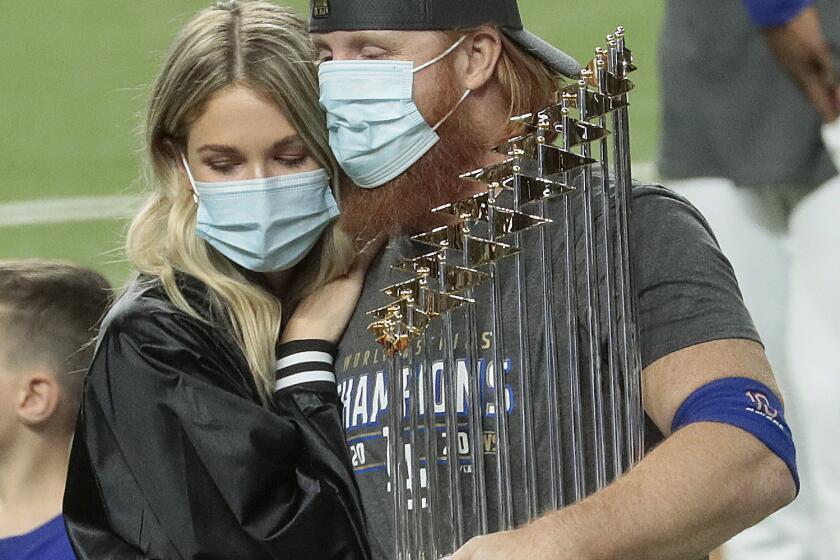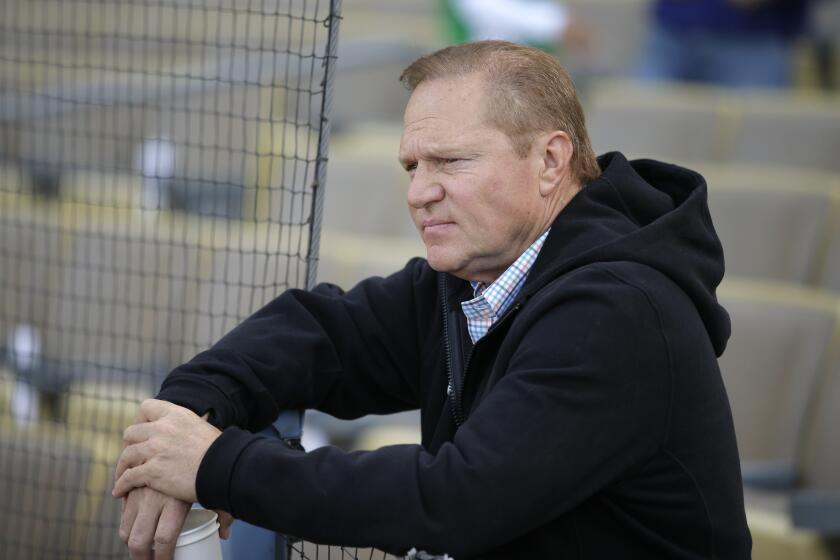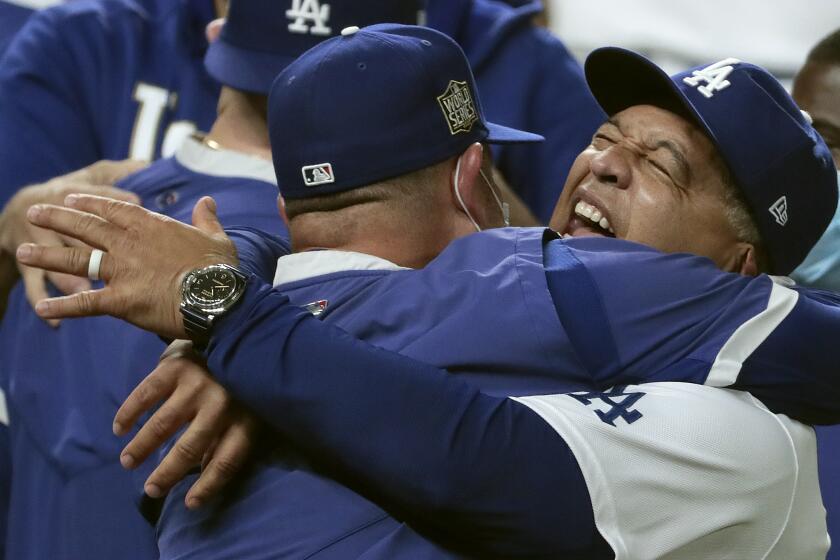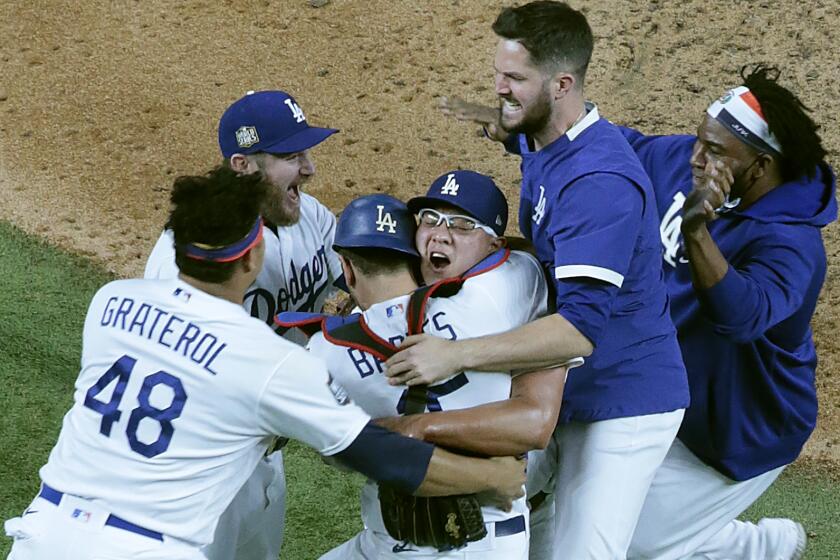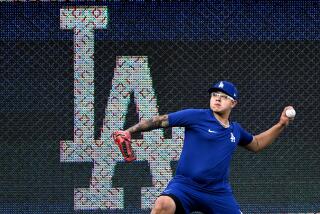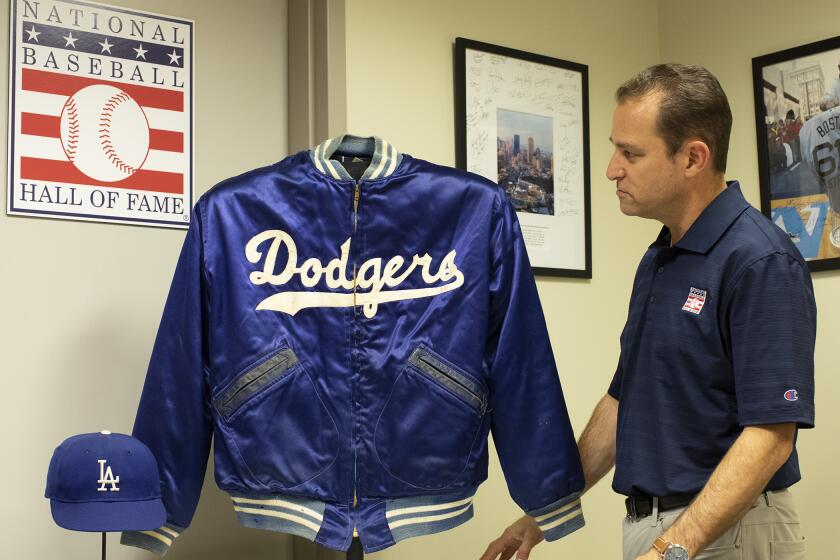For Julio Urías, winning World Series was about honoring the ‘Fernandomania’ legacy
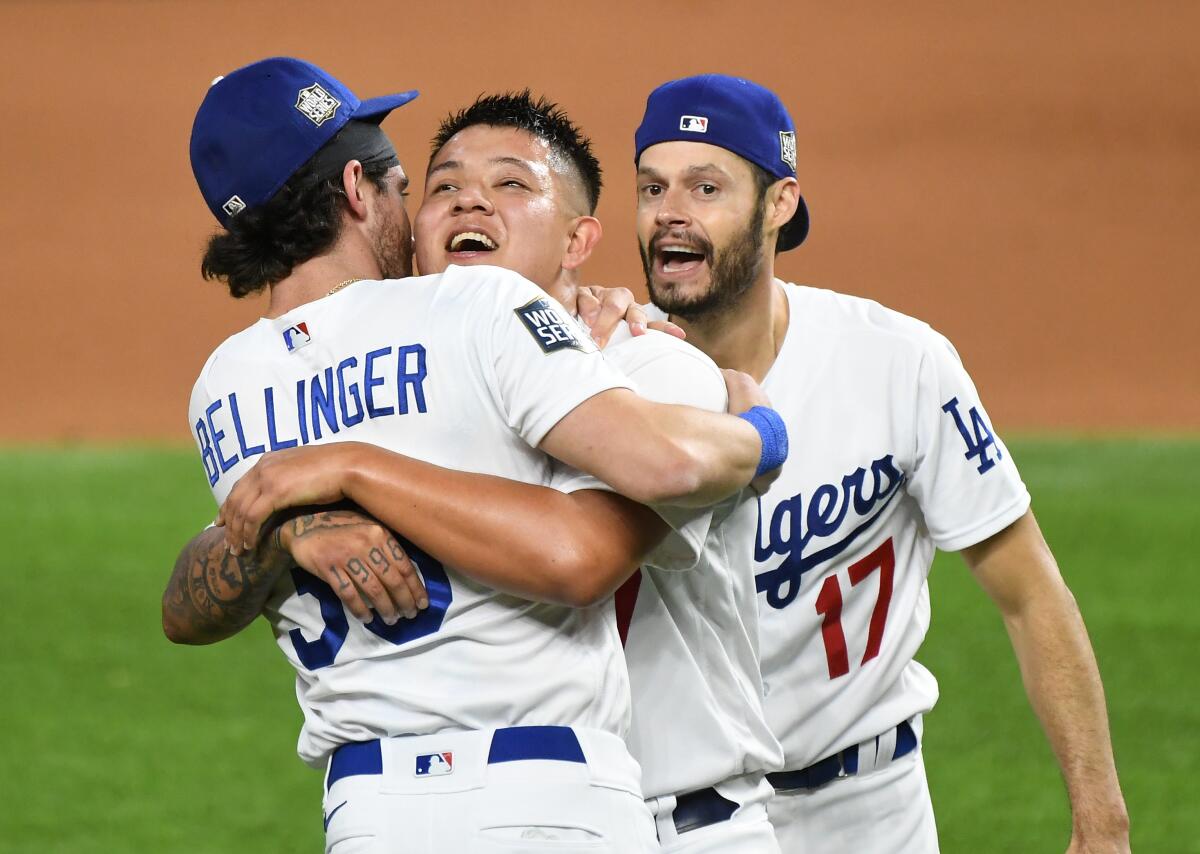
- Share via
Soon after Dodgers left-hander Julio Urías fired a 97-mph fastball past Willy Adames to close a World Series-clinching 3-1 win over the Tampa Bay Rays, he draped a Mexican flag over his shoulders and wore it like a cape for most of the postgame festivities.
How fitting, for as much as fans from his native country look to Urías for inspiration, Urías draws as much strength and motivation from them, using it as fuel for his superhero-like efforts during the team’s championship run.
“Totally,” Urías said, when asked if he felt like the Dodgers’ first World Series title in 32 years was a victory for Mexico. “The support I get from my countrymen is unconditional in the good times and the bad. I’m so happy, so proud to accomplish that. This is for me, but it’s also for them.”
Here’s what the science says about whether Justin Turner put other Dodgers at risk by celebrating their World Series win despite a positive coronavirus test.
Urías, who grew up in Culiacan in the northwestern Mexican state of Sinaloa, is only 24 and in his fifth season with the Dodgers, but he fully grasps the organization’s rich history and deep roots not only in Mexico but throughout Latin America and Southern California, home to a huge Latino fan base.
In his mind, Urías wasn’t just helping the Dodgers win their first World Series since 1988. He was carrying on the legacy of Fernando Valenzuela, the Navojoa, Mexico native who, as a 20-year-old left-hander in 1981, sparked the Fernandomania craze and pitched the Dodgers to a championship.
“Ever since I signed, since my debut, we all know which team is most popular among Mexican and Latino people, and it’s because of what Fernando was able to do,” Urías said. “The Dodgers are famous in Mexico, and you’re familiar with what it means to put that blue on. I’m very blessed to be part of the organization.”
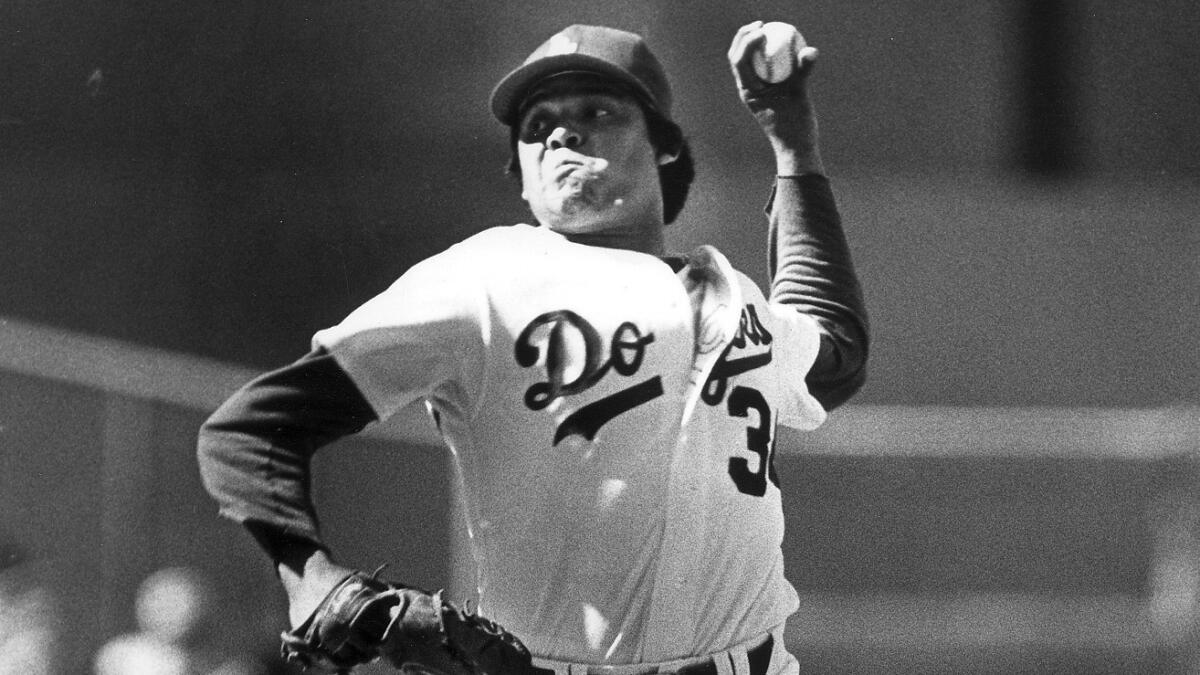
The Dodgers are lucky to have him. Urías played a key role in the postseason, going 4-0 with a 1.17 earned-run average and one save in six games, two starts. He allowed three runs and 11 hits in 23 innings, struck out 29, walked four and held batters to a .138 average and .441 on-base-plus-slugging percentage.
He nailed down the final nine outs of a 4-3 victory over Atlanta in Game 7 of the National League Championship Series. He retired the final seven batters in Game 6 of the World Series.
Urías joined former San Francisco ace Madison Bumgarner as the only pitchers with four wins and a save in a single postseason. His 29 strikeouts were the second most in a postseason by a player born outside the U.S., behind Orlando Hernandez, who struck out 31 for the New York Yankees in 2000.
“He was incredible this postseason,” Andrew Friedman, the Dodgers’ president of baseball operations, said Tuesday night. “Just the compete, the way he went about it, was as good as it gets. It just speaks volumes about him.
“He was a huge part of getting us to this point and then, obviously, a huge part of Game 7 of the NLCS and a huge part of Game 6 tonight.”
The Dodgers envisioned this kind of performance when they signed Urías for $450,000 as a 16-year-old in 2012, but the road to get here was not smooth or straight. It was filled with potholes, sudden lane changes and one major blowout.
Urías was eased into the big leagues as a 19-year-old in 2016 and underwent major shoulder surgery in 2017 that sidelined him for more than a year. His appearances, innings and pitch counts were closely monitored in 2019, when he shuffled between the rotation and bullpen. He was placed on a seven-day administrative leave last season after his arrest on a misdemeanor domestic battery charge, which was later dropped.
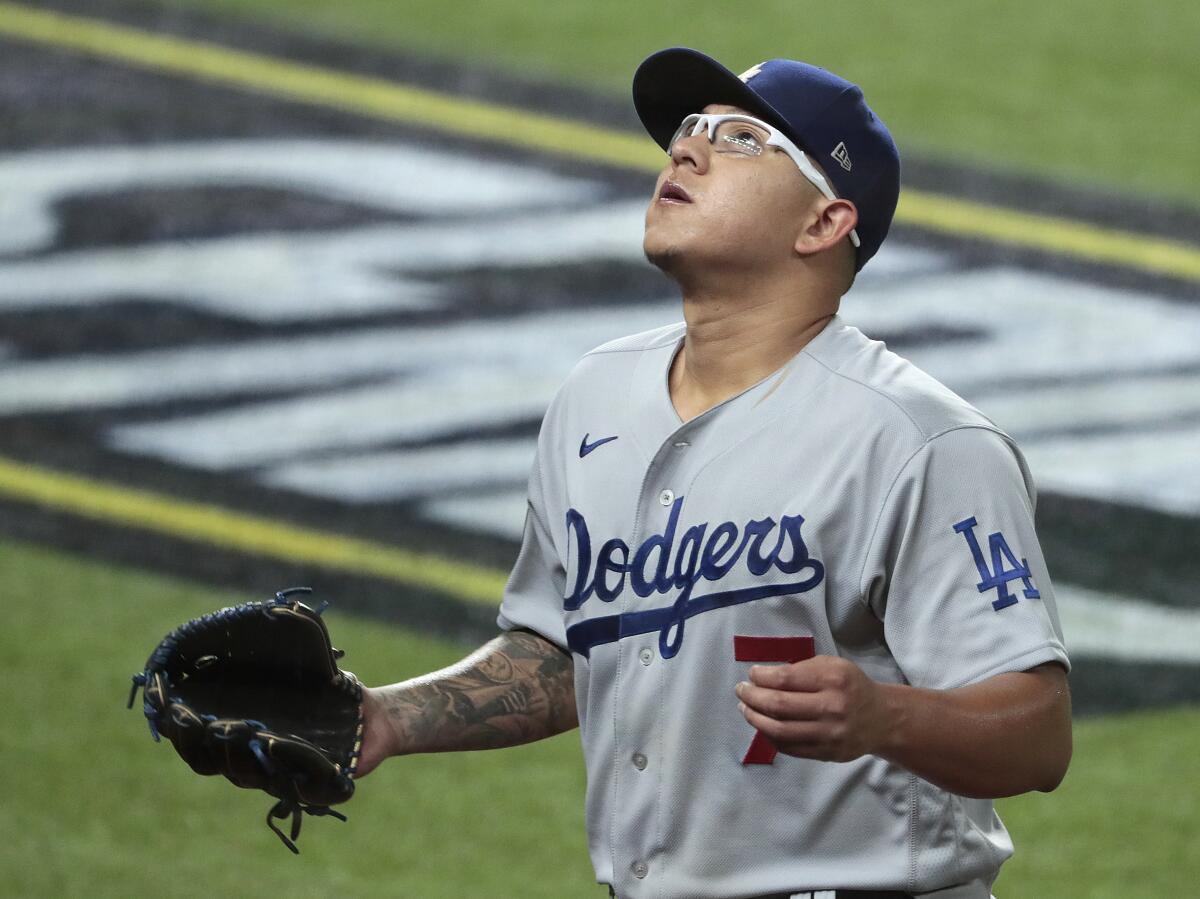
But as the playoffs evolved this season, the Dodgers removed what manager Dave Roberts called the “kid gloves” in their handling of Urías, who sometimes chafed under the team’s strict workloads but rarely complained publicly.
Urías relieved shaky starter Walker Buehler to start the fifth inning in the NL wild-card opener against Milwaukee and threw three scoreless innings, allowing three hits, striking out five and walking none, in a 4-2 win.
He entered Game 3 of the NL Division Series against San Diego with the bases loaded and two outs in the second and the Padres threatening to extend a one-run lead.
Urías struck out the dangerous Fernando Tatis Jr. with an 83-mph curve and went on to throw five one-hit innings, striking out six and walking one, in the Dodgers’ 12-3 clinching win.
“It was an unbelievable job by him,” catcher Will Smith said of the Tatis showdown. “Just coming in and going right at him, not being scared. It could have gotten away from us a little bit, and he really slammed the door on them.”
Sports agent Scott Boras is a proponent of having the World Series at a neutral site, but players on the Dodgers and Tampa Bay Rays are not fans of it.
Urías started Game 3 of the NLCS against the Braves, allowing one run and three hits in five innings and throwing a career-high 101 pitches. Four days later, Urías entered in the seventh inning of a tied Game 7 and retired nine straight batters in a 4-3 win.
“He’s just very confident — he doesn’t get too high, doesn’t get too low,” Roberts said after the dramatic win over the Braves. “He’s had a lot of big moments, but that was probably the biggest.”
Actually, there would be one more, even bigger moment. Urías started Game 4 of the World Series, allowing two runs and four hits, striking out nine and walking one in 4-2/3 innings of an 8-7 loss to the Rays.
Three days later, he relieved Brusdar Graterol with two outs in the seventh and the Dodgers clinging to a 2-1 lead. Urías struck out pinch-hitter Yandy Diaz and retired the side in order in the eighth.
His pitch count low, his stuff crisp, Urías was sent out for the ninth. He got Manuel Margot to fly to right and struck out Mike Brosseau looking at a 94-mph fastball on the inside corner.
Already a crucial figure in ending one long World Series drought, Dave Roberts and his steady cool exorcised the Dodgers’ demons — and some of his own.
When his final fastball froze Adames, Urías crouched with his back to the plate and pumped both fists. He rose, looked briefly to the sky and turned to find catcher Austin Barnes, who had shoved the game ball in his back pocket, heading toward him for a bear hug. The rest of his teammates stormed the mound.
“I was just focused on getting the one out,” Urías said. “And little by little, I just went batter by batter, and when I least expected it, I was getting the final out.”
About an hour later, Urías walked into a videoconference room, that Mexican flag still draped over his shoulders, and tried to describe the feeling of throwing the last pitch to win a World Series.
“It was the most important pitch, the most important out of my life,” Urías said. “It’s a beautiful feeling. You know everyone is waiting for that out, and I’m thankful to God for the opportunity, and thankful for the blessings.”
Complete coverage of the Dodgers winning their first World Series championship since 1988 after defeating the Tampa Bay Rays in the 2020 World Series.
More to Read
Are you a true-blue fan?
Get our Dodgers Dugout newsletter for insights, news and much more.
You may occasionally receive promotional content from the Los Angeles Times.

